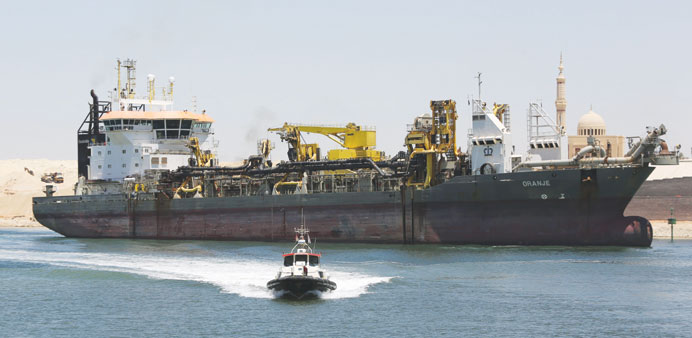Guardian News and Media
Ismailia
Egypt is this week set to inaugurate a major expansion of the Suez Canal finished in a third of the originally estimated time.
The $8bn project had been projected to take three years but on the orders of the president, Abdel Fatah al-Sisi, the former military chief who led the overthrow of an elected Islamist government amid protests in 2013, was completed after one year of feverish work.
The expansion adds an additional lane along part of the vital shipping channel which officials say will shorten the waiting time. It includes 35km of new channels cut through the desert and a further 37km where existing bodies of water were dredged to make way for larger ships.
“This is a huge undertaking on a world scale. It has been completed in a time that is frankly astonishing,” said Peter Hinchliffe, secretary general of the International Chamber of Shipping.
In order to complete the project in a year, the Egyptian government hired six international firms - including companies based in the US, Belgium, and the Netherlands - to dig new sections of canal and dredge the existing waterways. Those companies worked day and night on six separate sections of the project.
“If you pump enough money at something, of course it can get done. And that’s what happened,” said Angus Blair, president of the Signet Institute, an economics think tank in Cairo. “If you have the resources to do something, and you have the equipment to do it, you can do it.”
The government says the overall cost of the project will be $8bn, a figure which matches the funds raised from the sale of investment certificates, shares starting from as little as 10 Egyptian pounds.
In just one section of the project, lot number six - which included the dredging of the Great Bitter Lake - more than 1,100 workers laboured day and night between November and July, according to Dirk Draulans, a project manager for the Belgium-based DEME Group. They operated 12 dredgers and at least 40 support craft. Draulans said the project was a challenge but in the end, “we put in the means to make sure to finish in time”.
The government predicts the expansion of the canal will aid Egypt’s economy, which has been battered by years of instability in the wake of the 2011 popular uprising that ended the three-decade dictatorship of president Hosni Mubarak. Officials predict a more than twofold increase in revenues for the canal, from the present level of $5.3bn to $13.2bn in 2023.
The expansion could also reinforce the military’s dominance of the economy. Firms linked to the military make up a significant portion of the economy (though precise figures are impossible to obtain), and experts say the military also enjoys other economic advantages such as tax-free investments, the right to confiscate land, and preferential exchange rates. The new lane of the canal, built under military supervision, will further cement the military’s hegemony.
“The military, represented by the supreme council of the armed forces, the SCAF, is the most dominant political and economic player in Egypt at the moment,” said Omar Ashour, a senior lecturer at the University of Exeter and an associate fellow at Chatham House.
“(If) they found a formula to redistribute the revenues, I think (the canal) will empower them further financially and (make them) even more powerful in terms of their economic, in terms of dominance over the economic sector,” he said in a phone interview.
A crucial artery of world trade, the Suez Canal has long been a source of Egyptian national pride and even a symbol of nationalist resistance. President Gamal Abdel Nasser nationalised the canal in 1956, wresting it from British control and electrifying the Egyptian public at the height of his popular regime.
In anticipation of the opening ceremony for the expanded canal on Thursday, Sisi’s government along with state institutions has whipped up an atmosphere of nationalist pride, including adoring front page coverage in the Egyptian media. At Cairo airport, officials have been stamping visitors’ passports with a special stamp counting down the days until the inauguration. “Egypt’s Gift to The World,” the stamp reads in part.
“The Suez Canal has always been a symbol of the Egyptian people’s will,” said Vice Admiral Mohab Mamish, chairman of the Suez Canal Authority, speaking to journalists in Ismailia through an interpreter on Wednesday. “It was an epic. It was a very hard job. We invited experts of dredging and we had no time to waste and we feel that we have succeeded.”

